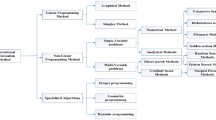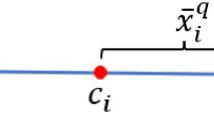Abstract
Large scale exhibition is a complex crowd system, providing quality service for many tourists is an important issue that managers must pay attention to. Intelligent information management system should adopt scientific and reasonable resource scheduling sche-me to improve the efficiency of the crowd management. Through the domestic and foreign literature research, this paper points out the deficiencies in the previous research, and analyzes the process of crowd service in large-scale exhibition activities. In order to carry out the management of tourist service resources in the large scale exhibition, the concept model of mobile resource scheduling is put forward, and the detailed introduction of each dimension is presented. Multi-resource scheduling model based on Dijkstra and multi-ant colony optimization algorithms are established respectively. The advantages and disadvantages of the two algorithms are compared through the numerical examples. Dijkstra algorithm is superior to multi-ant colony optimization algorithm in the cost control, but in the running time of the algorithm, multi-ant colony optimization algorithm is better than Dijkstra algorithm. The research has practical significance for the development of scientific and effective population service operation plan and service management plan for large scale exhibition activities.







Similar content being viewed by others
References
Berrichi A, Yalaoui F, Amodeo L, Mezghiche M (2010) Bi-objective ant colony optimization approach to optimize production and maintenance scheduling. Comput Oper Res 37(9):1584–1596
Chen WN, Zhang J, Chung HSH, Huang RZ, Liu O (2010) Optimizing discounted cash flows in project scheduling—an ant colony optimization approach. IEEE Trans Syst Man Cybern Part C (Appl Rev) 40 (1):64–77
Chen YF, Crespi N, Siano P (2017) Erouting: an eco-friendly navigation algorithm for traffic information industry. IEEE Trans Ind Inf 13(2):562–571
Chen YF, Guizani M, Zhang Y, Wang L, Crespi N, Lee GM (2017) When traffic flow prediction meets wireless big data analytics. arXiv:1709.08024
Chen YF, Li MC, Tang SJ, Sun WF (2014) Impact of duty cycle and radio range irregularity on localization algorithms for wireless sensor networks. Ad Hoc & Sensor Wireless Networks 21(3-4):219–235
Dai G, Qingli DA (2000) The study of combinatorial scheduling problem in emergency systems[J]. Syst Eng Theory Pract
Dijkstra M, Kramer R (2012) Line transfer through clumpy, large-scale outflows: Ly α absorption and haloes around star-forming galaxies. Mon Not R Astron Soc 424(3):1672–1693
Fiedrich F, Gehbauer F, Rickers U (2000) Optimized resource allocation for emergency response after earthquake disasters. Saf Sci 35(1):41–57
Gao SP, Liu SY (2003) Scheduling problem in multi-resource emergency systems based on the connection number. Syst Eng Theory Pract 6:017
Ichoua S, Gendreau M, Potvin JY (2003) Vehicle dispatching with time-dependent travel times. Eur J Oper Res 144(2):379–396
Li JQ, Pan QK, Gao KZ (2011) Pareto-based discrete artificial bee colony algorithm for multi-objective flexible job shop scheduling problems. Int J Adv Manuf Technol 55(9):1159–1169
Liu XJ, Yi H, Ni ZH (2013) Application of ant colony optimization algorithm in process planning optimization. J Intell Manuf 24(1):1–13
Malandraki C, Daskin MS (1992) Time dependent vehicle routing problems: formulations, properties and heuristic algorithms. Transp Sci 26(3):185–200
Moslehi G, Mahnam M (2011) A pareto approach to multi-objective flexible job-shop scheduling problem using particle swarm optimization and local search. Int J Prod Econ 129(1):14–22
Orlin JB, Madduri K, Subramani K, Williamson M (2010) A faster algorithm for the single source shortest path problem with few distinct positive lengths. J Discrete Algoritms 8(2):189– 198
Pan QK, Tasgetiren MF, Suganthan PN, Chua TJ (2011) A discrete artificial bee colony algorithm for the lot-streaming flow shop scheduling problem. Inform Sci 181(12):2455–2468
Panahi H, Tavakkoli-Moghaddam R (2011) Solving a multi-objective open shop scheduling problem by a novel hybrid ant colony optimization. Expert Syst Appl 38(3):2817–2822
Pisinger D, Ropke S (2007) A general heuristic for vehicle routing problems. Comput Oper Res 34 (8):2403–2435
Seo M, Kim D (2010) Ant colony optimisation with parameterised search space for the job shop scheduling problem. Int J Prod Res 48(4):1143–1154
Ting CJ, Chen CH (2013) A multiple ant colony optimization algorithm for the capacitated location routing problem. Int J Prod Econ 141(1):34–44
Wang P, Hunter T, Bayen AM, Schechtner K, González MC (2012) Understanding road usage patterns in urban areas. Sci Rep 2:1001
Xing LN, Chen YW, Wang P, Zhao QS, Xiong J (2010) A knowledge-based ant colony optimization for flexible job shop scheduling problems. Appl Soft Comput 10(3):888–896
Yang J, Zhuang Y (2010) An improved ant colony optimization algorithm for solving a complex combinatorial optimization problem. Appl Soft Comput 10(2):653–660
Yu B, Yang Z, Xie J (2011) A parallel improved ant colony optimization for multi-depot vehicle routing problem. J Oper Res Soc 62(1):183–188
Acknowledgements
This research was supported by the National Natural Science Foundation of China (No.61640020).
Author information
Authors and Affiliations
Corresponding author
Rights and permissions
About this article
Cite this article
Zhou, CQ., Yang, YW., Gong, B. et al. The Model Design of Mobile Resource Scheduling in Large Scale Activities. Mobile Netw Appl 23, 382–394 (2018). https://doi.org/10.1007/s11036-018-1023-1
Published:
Issue Date:
DOI: https://doi.org/10.1007/s11036-018-1023-1




